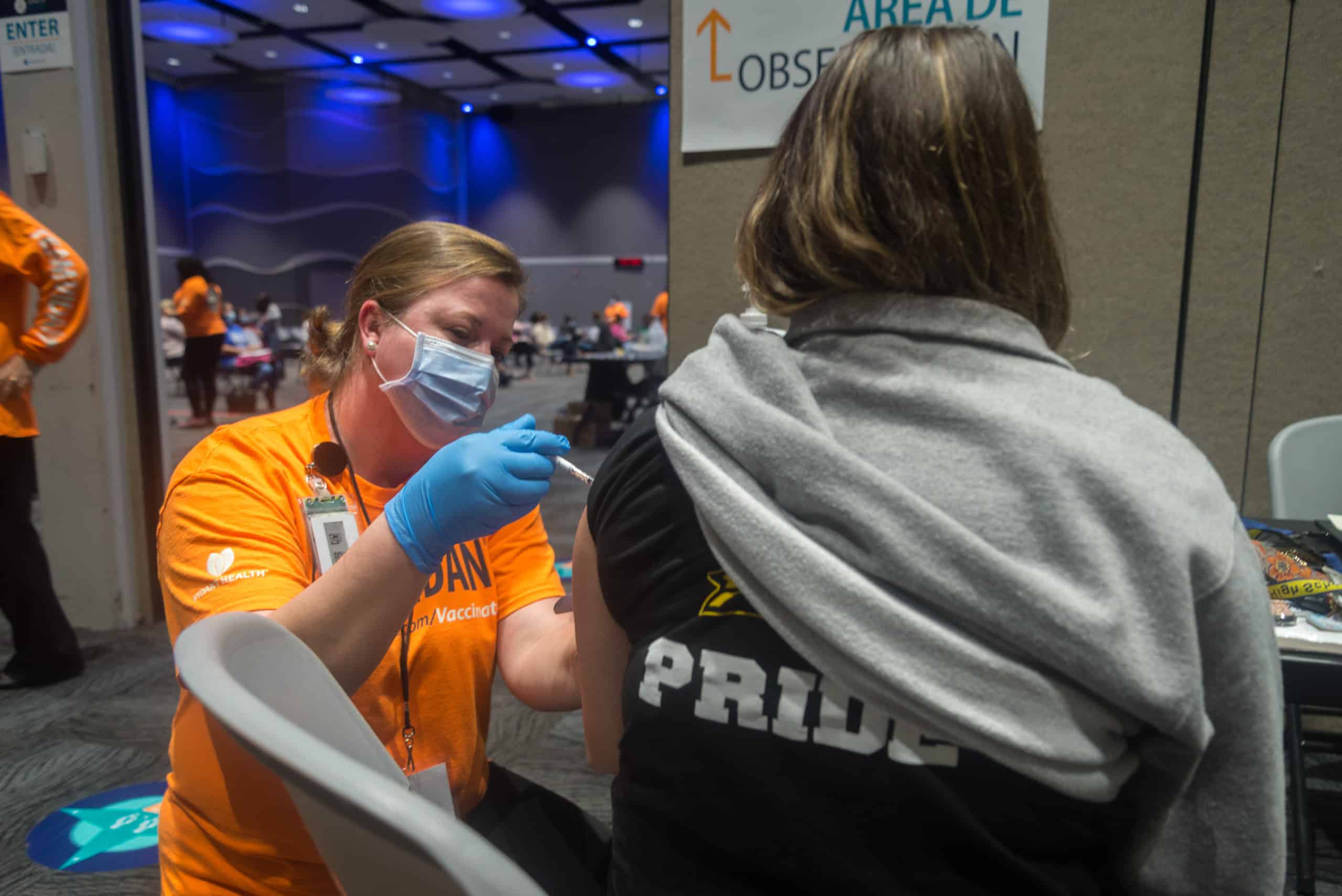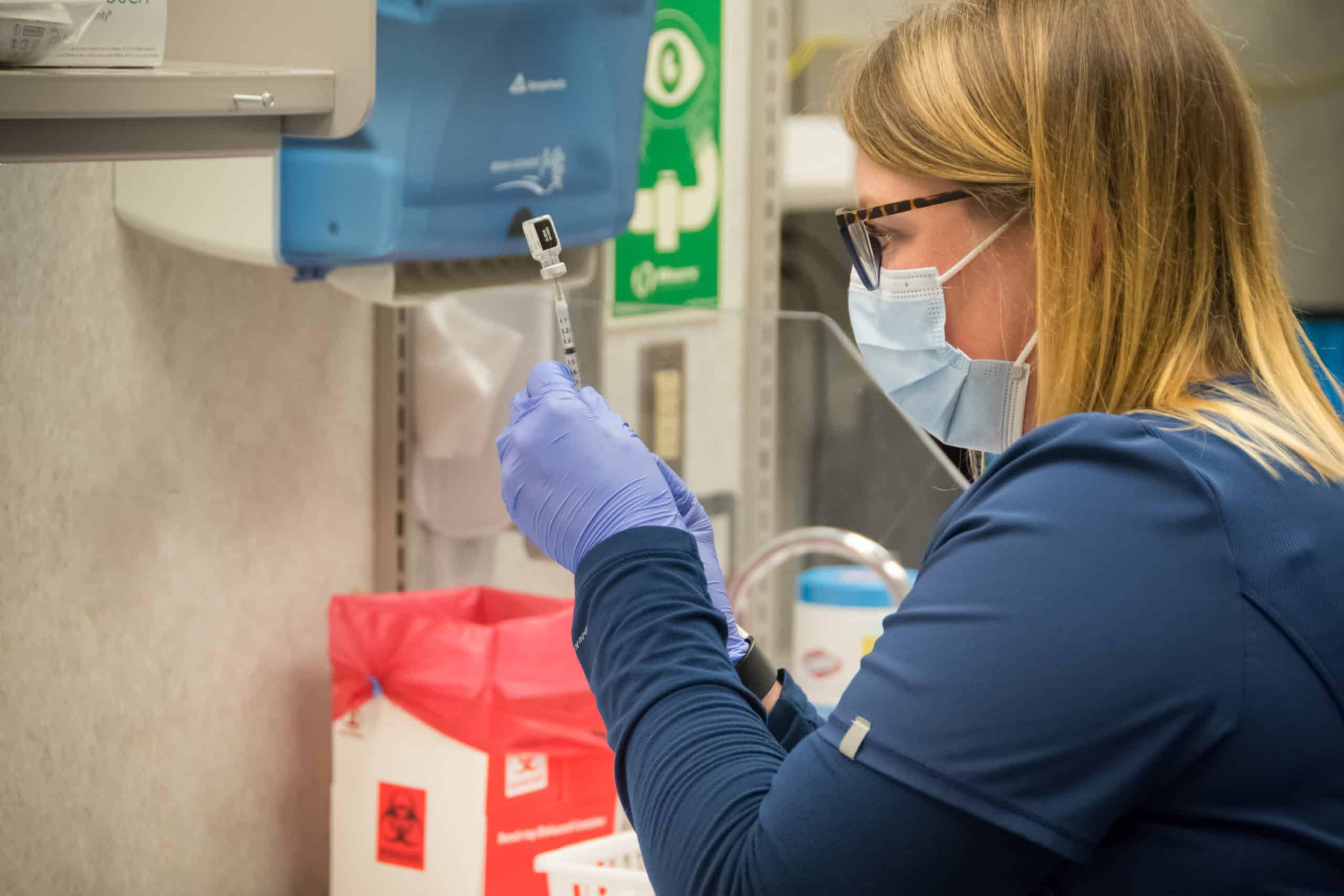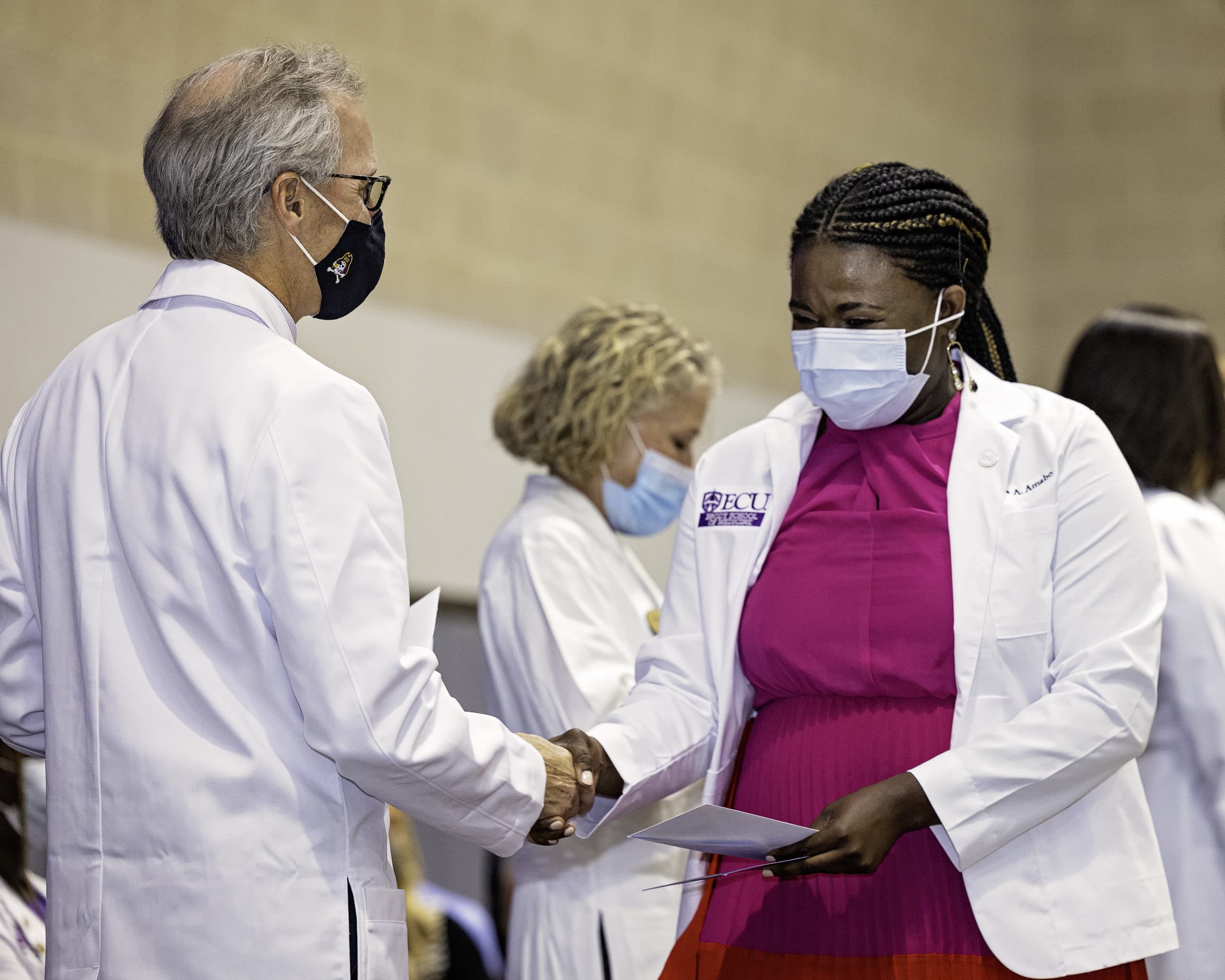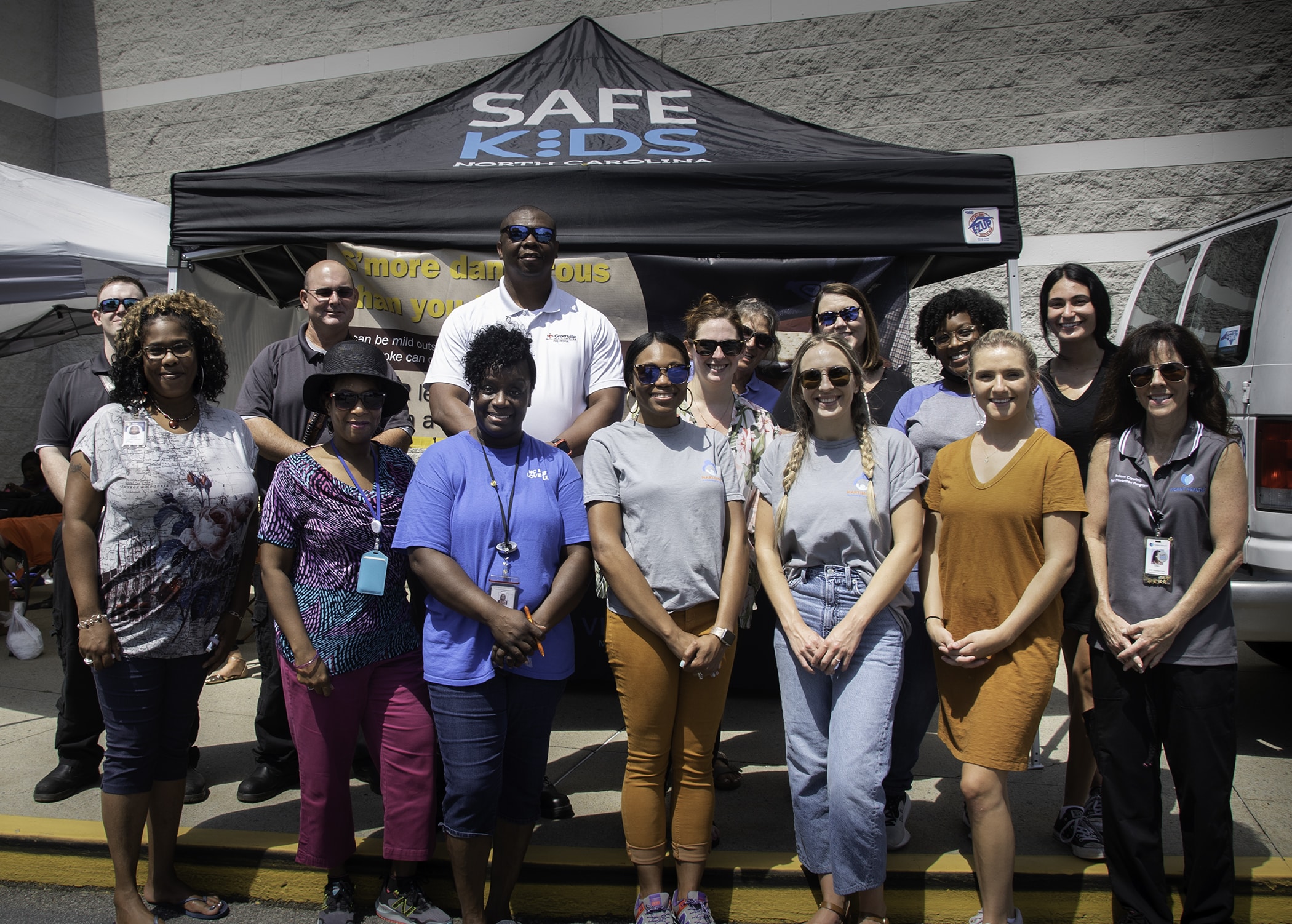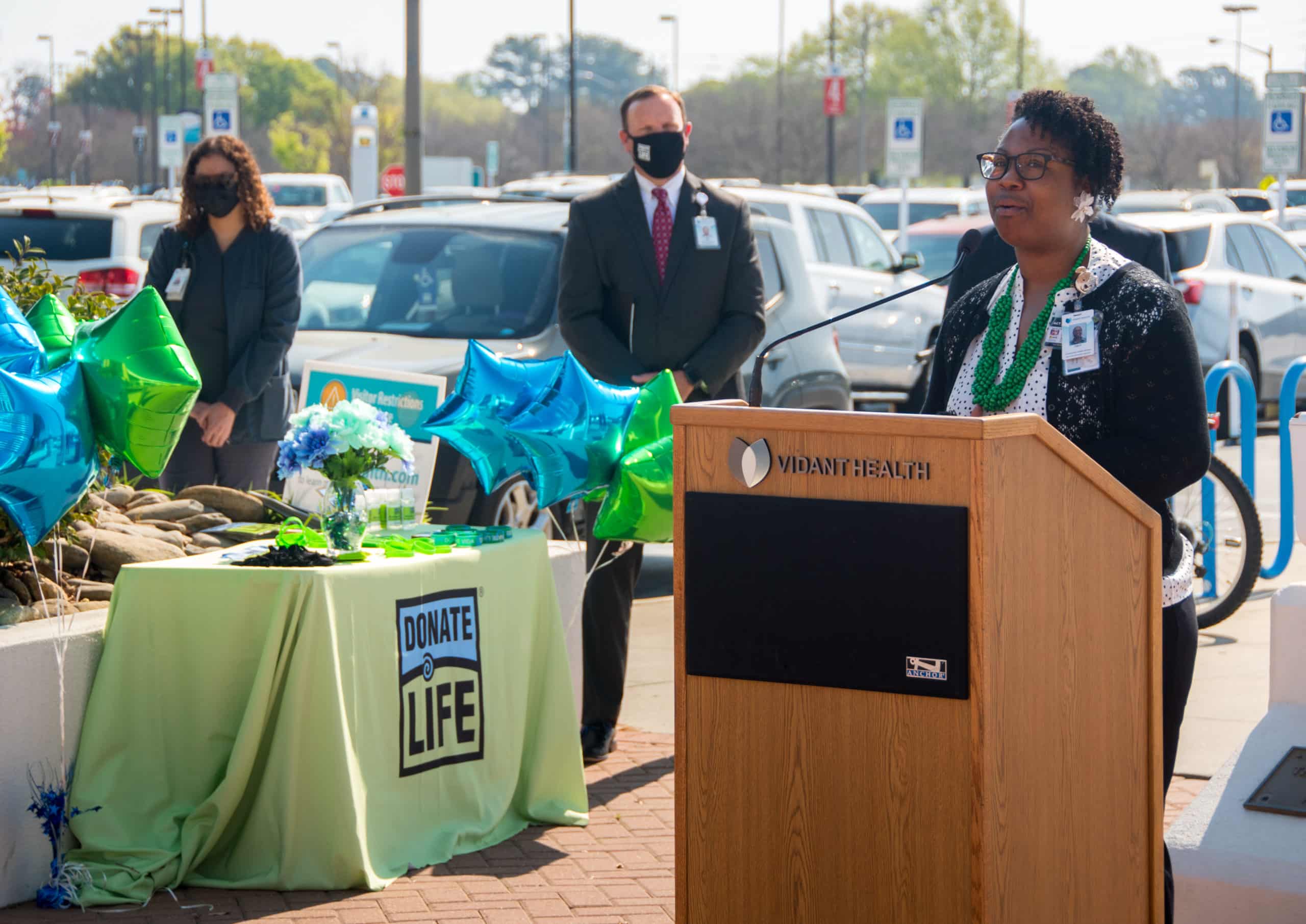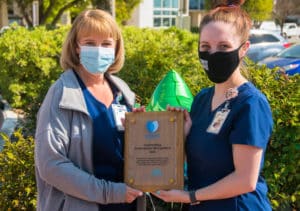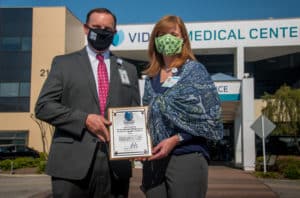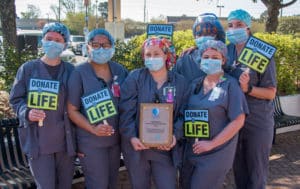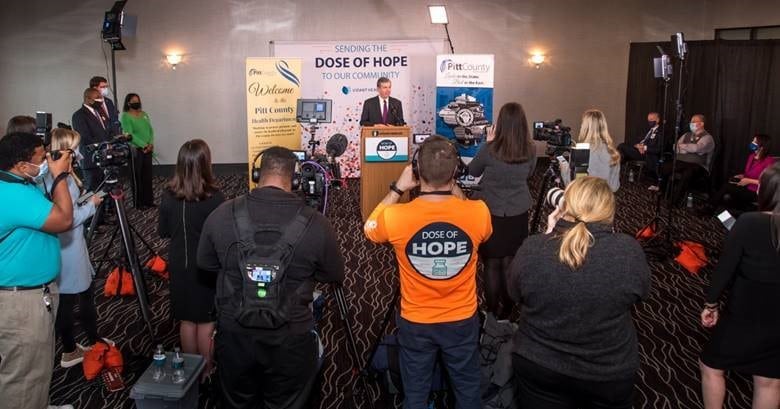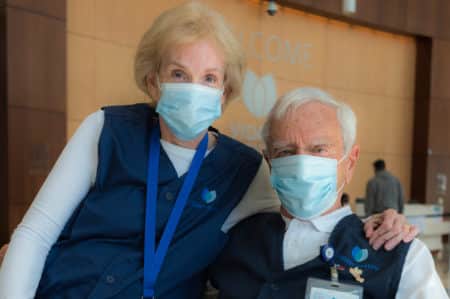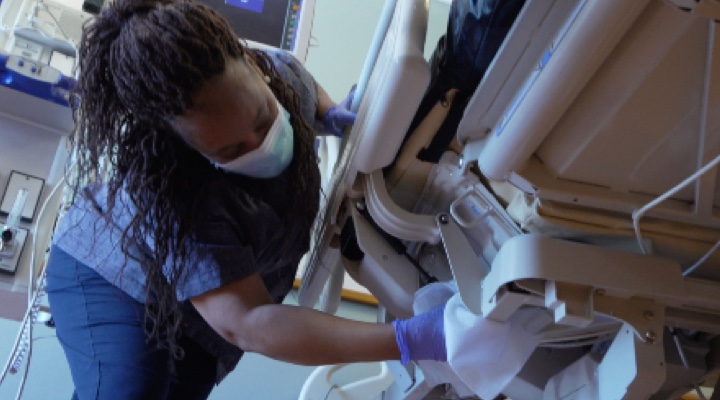COVID-19 continues to evolve and expand its grip across the country and here in eastern North Carolina.
“This is one of the most diabolical viruses I’ve ever seen,” said Dr. Paul Bolin, chief of Adult Medical Services at ECU Health Medical Center, and the chair of the Department of Medicine at Brody School of Medicine at East Carolina University.
“We were in a good place. Transmission had slowed down, more and more people were getting vaccinated and protected, hospitalization days started to really come down, number of cases started to come down – and many of us thought we were in the last leg of this marathon,” said Dr. Niti Armistead, chief medical officer for Vidant Health. “What changed was the vaccination rates just hit a wall.”
“In North Carolina, in the past three to four weeks, we have seen a tripling in the number of cases, and in the number of hospitalizations,” said Dr. Bolin. “We’re seeing the same things as we did last fall and winter, but it’s in a much younger and much healthier population.”
Another difference now – we have a vaccine.
“It’s like wearing your seatbelt – your chances of being in an automobile accident are very low, but your chances of surviving that with a seatbelt are much greater,” said Dr. Bolin. “Your chance of surviving COVID are 25 fold better with the vaccine than without it.”
Even still – roughly half of the country remains unvaccinated, enabling the virus to mutate and variants to cause an increase in infections and complications.
“The virus didn’t slow down just because our vaccination rates dropped,” said Dr. Armistead.
Experts say most concerns about the vaccine don’t outweigh the risk of being unprotected.
“I think the most important thing to understand is this: there have been some very small number of complications from the vaccine. And that is a one-time event that occurs after the vaccination,” said Dr. Bolin. “Your risk of dying from COVID if you’re not vaccinated continues day after day after day after day, until this pandemic is over with.”
Vidant Health has appointments available for anyone eligible to receive the vaccine. Visit www.VidantHealth.com/vaccinate and schedule yours today.
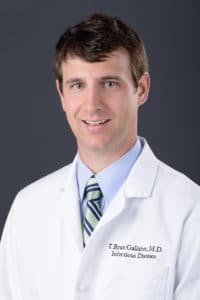 The arrival of the COVID-19 vaccines brought great hope in the battle against the deadly pandemic that has affected our way of life for nearly a year and a half. Now, more than 7 months into the largest vaccination effort in history, the data and science is clear: the vaccines are effective, but only if people get their “dose of hope”.
The arrival of the COVID-19 vaccines brought great hope in the battle against the deadly pandemic that has affected our way of life for nearly a year and a half. Now, more than 7 months into the largest vaccination effort in history, the data and science is clear: the vaccines are effective, but only if people get their “dose of hope”.
The continued spread of the virus and the arrival of new variants is an urgent reminder that this pandemic is not over yet, and that we still have to assure vaccination for everyone to protect our communities. Right now, the Delta variant is quickly becoming the dominant virus variant. We know that this variant is easily spread and has many of the same devastating health impacts as previous variants. We also know that the vaccines are highly effective at both preventing the spread of the virus and drastically reducing the impact on those it infects.
It was not long ago that some hospitals around the country celebrated having zero COVID-19 patients in their Intensive Care Units. Doctors, nurses and other staff rejoiced at this welcomed respite. Here at Vidant, we never quite got to zero, but our numbers hit a new low in the spring. Now, hospitalizations are back on the rise and nearly all hospitalized COVID-19 patients – many of whom are battling for their lives – are unvaccinated.
As we have continued to learn more and more about this virus over the past year and a half, we can confidently say that ending up hospitalized with serious complications from COVID-19 is mostly avoidable now. The vaccines are safe, effective and widely available at local hospitals, clinics, health departments, pharmacies and more.
We can still see the light at the end of the tunnel but the Delta variant is dimming our view. Help us end this pandemic by receiving your COVID-19 vaccine as soon as possible by visiting VidantHealth.com/Vaccinate or by calling 252-847-8000.
The ceremony signified each student’s entrance into the medical profession and the beginning of their commitment to serve others. While they will take classes at the Brody School of Medicine, each student will gain crucial experience at ECU Health Medical Center and throughout the Vidant Health system.
Dr. Michael Waldrum, CEO of Vidant Health and dean of the Brody School of Medicine, served as keynote speaker for the event.
“A white coat is a symbol of being a physician, part of a unique and special profession,” Dr. Waldrum said. “It’s unique in its caring and helping when people and communities need it most. It’s about human relationship and understanding each other. It’s about constant learning and striving. We’ll never stop dealing with the issues – that’s what this profession is about.”
This incoming class is the first that Dr. Waldrum will oversee as dean of the Brody School of Medicine after taking on the position at the beginning of July. The Class of 2025 will experience ECU and Vidant’s clinical integration as both aim to better serve eastern North Carolina.
Dr. Waldrum said this is a critical step to address the challenges we face here in the East.
“This is a special time for me as a young dean – young in my tenure – because of the profound responsibility that I have as we integrate the Vidant Health system and the Brody School of Medicine and build on the foundation that has been created,” Dr. Waldrum said. “I’m excited to strengthen our communities and deal with the disparities and the issues we are faced with as rural North Carolina and rural America.”
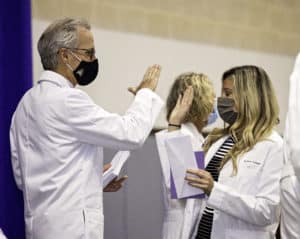
Photos Courtesy of ECU News Services
The class is set up for success with varied experiences, the hunger to learn and a health system a school of medicine ready to support each student.
The 89 students include 45 students that graduated with honors, five collegiate athletes, two veterans and five who had parents that graduated from Brody. Dr. Cedric Bright, associate dean for admissions at Brody School of Medicine, said 14 percent of the class are first-generation college graduates and 44 percent of the class are re-applicants to the program – a testament to the resiliency of the class.
“You all have incredible stories, about caring, about bringing what North Carolina has in diversity, experience, pursuit of knowledge – all of these to make North Carolina better,” Dr. Waldrum said. “Those are the stories I’ve heard and that’s the story of the Brody School of Medicine. Those diverse perspectives in life coming together to learn and grow is how we collaborate to solve systemic issues that plague our communities and it’s our responsibility to do so.”
There were more than 1,200 applicants for the Class of 2025 – a record number for the Brody School of Medicine. Dr. Waldrum said it was not surprising as he believes young people were energized during the COVID-19 pandemic to help people in need of health care.
Dr. Waldrum said the Brody School of Medicine is crucial in producing what North Carolina needs from physicians.
“Brody School of Medicine has been so important in moving eastern North Carolina forward and serving the state and rural populations,” Dr. Waldrum said. “I’ve said it a million times – Brody is the highest value medical school in the country because, if you look at the investment by the state to have a physician stay in the state and practice in rural and underserved communities, there’s nobody in the nation that does it better than Brody.”
Vidant Health’s Eastern Carolina Injury Prevention Program (ECIPP) partnered with Martin-Pitt Partnership for Children, the Pitt County Health Department and Greenville Fire-Rescue to educate community members about the dangers children, senior adults and pets can face in a hot car.
ECIPP Coordinator Ellen Walston said five children have already died in the United States this year from being left in a vehicle on warm days. Since 1998, when tracking began for these deaths, there have been 888 deaths across the country.
“Temperatures rise so quickly in a car and when a car is enclosed,” Walston said. “There is a myth that if you crack a window, the temperature will be reduced and that really does not happen. They heat up so quickly and we actually have a way to measure that today, just to show you how quickly cars can heat.”
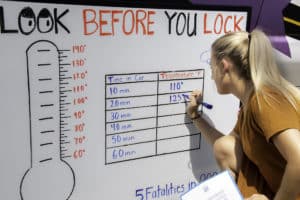 This exercise took place on a 90-degree day. The temperature inside a parked car rose to 110 degrees within 10 minutes and over 120 degrees within 15 minutes.
This exercise took place on a 90-degree day. The temperature inside a parked car rose to 110 degrees within 10 minutes and over 120 degrees within 15 minutes.
Walston said while the risk is still high for seniors and pets, the majority of deaths that occur are in children under 2 years old. Children have less body surface area, so they are not able to cool themselves as quickly as adults and most of these children cannot verbalize if they are too hot.
In 53 percent of cases, a child is forgotten in the car by a parent or caregiver – often because that person is out of their daily routine. Walston said leaving a reminder for yourself can save a life.
“We always want to make sure that you have some type of reminder for yourself that the child is in the car because we do want the child to be in the rear seat,” Walston said. “If you can put your purse, a briefcase, your wallet, something in the backseat to remind you. We also have plenty of alarms on our phones and other devices that we use – just set an alarm. Particularly if it’s out of your normal routine.”
This reminder came at an important time as more people are out and traveling and running errands away from the house this year as COVID-19 restrictions are loosened and routines have changed.
Walston said now is the time to be vigilant if you are traveling with children, a senior adult or pets — or if you see one in a hot car.
“We always want a bystander to act and that means you need to take action right away,” Walston said. “So many times people are concerned about breaking a window, if they would be responsible. We ask you to take action, we ask that you immediately call 911. Please don’t wait to see if someone else will take action. We never want them left alone in a car – even for one minute.”
Learn more about the varied support ECIPP offers by visiting VidantHealth.com.
On April 7, ECU Health Medical Center (VMC) hosted its Donate Life event, Pause to Give Life, to recognize organ donors and their families. Vidant team members, including the donor resource team and transplant team, were among those in attendance.
During the ceremony, the Donate Life flag was raised on the VMC flagpole at 10:08 a.m., a time symbolic of the ratio of one donor being able to save up to eight lives. Following the raising of the flag, a 30-second moment of silence was observed to honor donors and their families and recognize the more than 3,000 patients waiting for a life-saving transplant in North Carolina.
“It was a record year for organ donors at Vidant. We had 55 donors in 2020 that resulted in saving or enhancing 179 lives by those donations,” said Van Smith, VMC executive vice president of operations. “This is a celebration of the work of Vidant and Carolina Donor Services in partnership to support the community and improve the quality of life across eastern North Carolina.”
Carolina Donor Services President and CEO Danielle Niedfeldt recognized VMC for the record year of organ donations with an Outstanding Service Award during the event. Niedfeldt said in addition to a record year for transplantations at VMC, the hospital performed at a remarkable level in its own right and as compared to others within the Carolina Donor Services area.
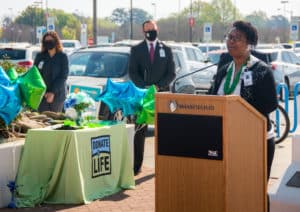 Among the speakers at the event was Gerri Ashe, a community health worker at Vidant Health. She shared her story as a family donor – or someone whose loved ones have donated organs after they have passed.
Among the speakers at the event was Gerri Ashe, a community health worker at Vidant Health. She shared her story as a family donor – or someone whose loved ones have donated organs after they have passed.
Ashe began working at Vidant in February of 2008. In November of that same year, her oldest brother passed away from a stroke at just 43 years old. She recalled that when she was getting her license her dad told her to sign up as an organ donor and her siblings did the same. After his passing, they learned he would be able to donate three organs – his heart and his corneas.
“At that time, I decided to turn what seemed to be a really difficult situation into a positive moment of being able to share my story,” Ashe said. “It also made me want to get more involved and become more educated so I could help families understand the process.”
Ashe said she completed her studies in health education and promotion this past February.
As a community health worker, Ashe has many responsibilities in educating eastern North Carolina and connecting people to services or resources that they need to be healthy.
She said she also tries to raise awareness for the need of organ donation and stresses the importance of healthy living for anyone who may be interested in being an organ donor.
“No matter what decision a family makes, if I can just help them during that time – even as difficult as it is – I know I’ve done my job as a family donor,” Ashe said. “That’s how I honor my brother’s memory is by spreading the word and helping others realize how important it is to donate.”
If you’d like to learn more about being an organ donor or register as an organ donor, visit the Carolina Donor Services website. Learn more about Vidant’s transplant services.
The Vidant / Pitt County Large-Scale Vaccine Clinic at the Greenville Convention Center has helped thousands of people get their dose of hope in eastern North Carolina and beyond.
On March 19, the site served as a backdrop for a visit from North Carolina Governor Roy Cooper and other state and local officials.
“We see the data of where these vaccinations are going,” said Cooper. “Therefore, we know what we need to do and we know who is being left out.”
“We’re not done,” said Dr. Michael Waldrum, CEO of Vidant Health. “The game is still being played and we have to play all 60 minutes of this football game, and keep our communities safe.”
The site itself has been a monumental undertaking in support of the communities Vidant serves.
With support from team members and volunteers – to date, more than 70,000 vaccinations have been administered here and at other vaccination sites across the region.
“It’s been a tragic and a trying time,” said Dr. John Silvernail, director of the Pitt County Health Department. “It’s also been a time of great cooperation and a chance to learn from one another.”
While much great work has been done, state and local leaders remain focused on the path ahead.
“As Dr. Waldrum and Dr. Silvernail also said, we cannot spike the football too early,” said Cooper. “We know these variants are out there. We’ve seen them flare up in other countries, in other states. We don’t want that to happen in North Carolina.”
For the latest information on vaccine availability and eligibility, please visit VidantHealth.com/vaccinate.
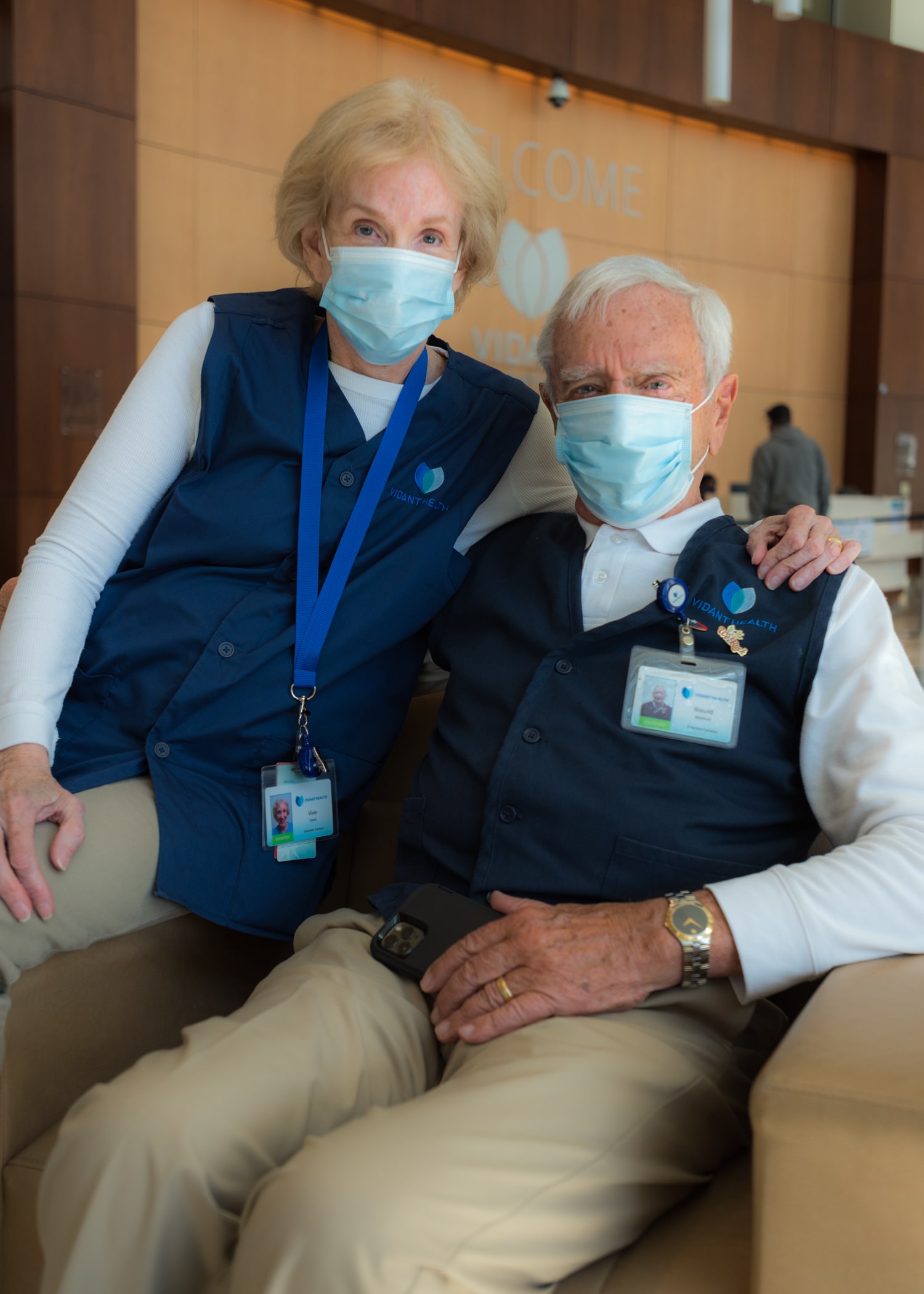 Ronald and Vivie Baseford’s hearts of service led them to each other.
Ronald and Vivie Baseford’s hearts of service led them to each other.
Ron began volunteering at Vidant Medical Center (VMC) around January of 2019 and has worked as a patient escort since. Vivie stopped working about two years ago and began volunteering at VMC in October of 2019. It didn’t take long for Vivie to catch Ron’s eye.
“About a week or two after I started, we passed each other in the hall,” Vivie said.
“We were wheeling patients,” Ron said. “Vivie and I passed each other in the corridors a couple of times and smiled and I said ‘Oh boy. I wish everyone had a smile like yours.’ And we just took it from there.”
There were lunches in the cafeteria at VMC before things became a little more formal. Dinners at Vivie’s house and date nights around town became the norm for them. They travel together, love watching movies and both find a piece of joy in spending time serving others.
When the pandemic began to intensify, the volunteering at VMC was halted but Ron and Vivie grew closer together. They decided to move in together and were married on July 7, 2020.
“We’ve been happy ever since,” Ron said. “We have the same interests. We love to travel, we love to go places in the car and visit places around here. We like to go up in the mountains and hike and see some of the waterfalls in that area.”
The time away from volunteering left some quality honeymoon time for the two, and they kept busy while away from helping patients, families and team members at VMC. They returned to volunteering about eight weeks ago, both on Monday mornings but in different areas of the hospital.
Vivie volunteers in the Eddie & Allison Jo Smith Tower and is happy to be back helping serve her community. Her love for the medical field goes back to her schooling days. While her first husband attended medical school, she sat in on classes with him and later worked with the Red Cross for a number of years.
“I always had an interest in that type of thing,” Vivie said. “When my first husband was stationed in Germany, I worked for the Red Cross and I volunteered. When he went into Rocky Mount to start his practice, I worked at the Red Cross also. I’ve been doing stuff like this practically all my life.”
She said she has enjoys interacting with patients and Vidant team members and the opportunity to be involved in health care again.
“When I was working, I worked as a teller at a bank, so I love people,” she said. “Just to be with people and help them, it makes me feel so good. Anything I can do for them, anywhere I can take them is just great. It’s very fulfilling to me.”
Ron, known as Mr. Ron around VMC, said he loves to meet new people and his role as a patient escort gives him the chance to talk to many different people each Monday.
“I like to talk to people,” he said. “While we’re walking, most of them are tense because they don’t know what they’re going to do and I certainly can’t help them with that but I talk to them about the weather and where they’re from and so forth and so on. We both very much look forward to going in on Mondays.”
Another benefit, Ron said, is the exercise he gets while escorting patients during his four-hour volunteering shifts. He said the exercise app he uses says he averages between five and six miles most Mondays while walking with patients and families through the hospital.
“It always pleases me because, all the people there, not only the patients but relatives that go with them sometimes, are all so very appreciative,” he said. “That’s always what makes it worth walking that six miles.”
“The people that work at the hospital are so appreciative of us, too, which really makes a difference,” Vivie added. “They make us feel like part of the team and they’re such nice people.”
If you would like to join Ron, Vivie and the other amazing volunteers at Vidant Health, visit VidantHealth.com/Volunteers/.
Now that the curve continues to flatten, Vidant is phasing in the essential care and services, defined as any surgery or procedure that, if not done within four weeks, would potentially harm the patient. This includes select general and orthopedic surgeries, cardiac, vascular and gastroenterology procedures.
Dr. Michael Waldrum, CEO of Vidant, said eastern North Carolina has higher rates of chronic conditions and diseases meaning these essential care and services play a large role in caring for the region. He said it will be important to take a phased approach over time to ensure safety of patients and team members. He said Vidant is using well-established protocols that reflect guidelines and best practices outlined by the Centers for Medicare and Medicaid Services, the U.S. Surgeon General and the Centers for Disease Control and Prevention.
